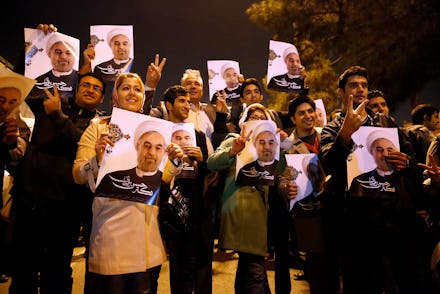For Young Iranians, the 2013 Iran Nuclear Deal Is Just the Beginning

I visited my family in August, shortly after President Hassan Rouhani's inauguration. It was a different atmosphere from my previous visits to Tehran; everyone around me seemed cautiously optimistic. I sensed a glimmer of hope that sanctions, which have crippled the lives of many Iranians, might be relaxed under new leadership.
I've written for PolicyMic before about witnessing the human impact of sanctions in Iran firsthand. When I visited my family, I saw that sanctions impact life at every level, even access to basic necessities like healthcare and food.
It looks like Rouhani's promises of reform have not been empty. Late on Saturday night, a deal was reached to curb Iran's nuclear program, after another round of negotiations in Geneva. It wasn't just a victory for the millions of Iranians unfairly impacted by international sanctions, but also confirmation that diplomatic engagement with Iran works.
The deal entails that Iran's nuclear program will essentially be stalled in exchange for eased international sanctions. Upon their return from Geneva, Iran's negotiation team was welcomed by cheering crowds carrying flags and banners.
I've felt a sense of relief coming from the people that I know back in Iran, and we're experiencing the same happiness even here in the diaspora. My cousin, Ghazaleh, sent me this picture, which she says is being circulated on social media now:
On the phone, Ghazaleh expressed her happiness with the agreement, and said that "most of the people who voted for Rouhani are also happy."
She spoke of the historic agreement as a unifying moment for Iranians. I can see why. According to a Gallup poll conducted earlier this month, 85% of Iranians admit that their lives have been hurt in some shape or form by international sanctions.
I also spoke to Yasmin Torabi, a student at the University of Ottawa, who moved to Canada three years ago to study. She stressed that the sanctions placed "the most pressure on the people, rather than the government."
Torabi added that the deal showed the world the moderate face of Iran, one that is far different than the image created by former President Mahmoud Ahmadinejad. It also offers hope that relations will improve with the West. Hopefully, this will help paint a different picture of Iran, one that is more human, and seen outside of the lens of the regime.
The social restrictions associated with Iran — ranging from women's strict dress codes to online censorship — are certainly things that young people want to change. But economic improvements have been a priority.
With over 60% of Iran's population under age 30, the demands of young people will only become more important as time goes on. University students have been the source of many conflicts with the government. So although this agreement is generally a positive development for all Iranians, the government should expect to continue to be tested by their very own.
Rouhani has proved that he can put action behind his words, and hopefully this is a sign of what is to come. I firmly believe that Iran will only continue to move forward and follow through with its commitments. If this does, in fact, happen, I hope sanctions fade completely. Opening up Iran will undoubtedly improve its economy and perhaps even encourage greater social reforms. Iran is moving forward, slowly but surely.